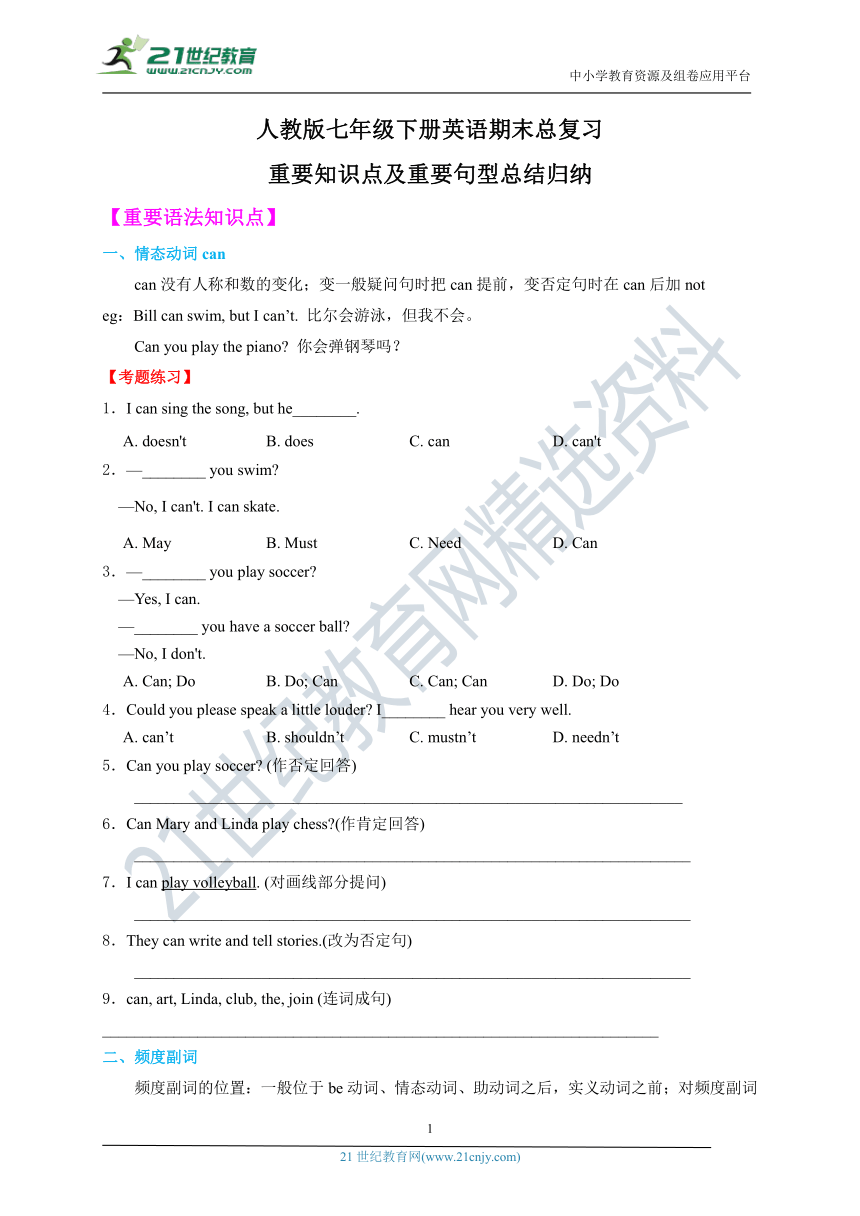
中小学教育资源及组卷应用平台 人教版七年级下册英语期末总复习 重要知识点及重要句型总结归纳 【重要语法知识点】 情态动词can can没有人称和数的变化;变一般疑问句时把can提前,变否定句时在can后加not eg:Bill can swim, but I can’t. 比尔会游泳,但我不会。 Can you play the piano? 你会弹钢琴吗? 【考题练习】 I can sing the song, but he_____. A. doesn't B. does C. can D. can't —_____ you swim? —No, I can't. I can skate. A. May B. Must C. Need D. Can —_____ you play soccer? —Yes, I can. —_____ you have a soccer ball? —No, I don't. A. Can; Do B. Do; Can C. Can; Can D. Do; Do Could you please speak a little louder? I_____ hear you very well. A. can’t B. shouldn’t C. mustn’t D. needn’t Can you play soccer? (作否定回答) _____ Can Mary and Linda play chess?(作肯定回答) _____ I can play volleyball. (对画线部分提问) _____ They can write and tell stories.(改为否定句) _____ can, art, Linda, club, the, join (连词成句) _____ 频度副词 频度副词的位置:一般位于be动词、情态动词、助动词之后,实义动词之前;对频度副词提问时用how often eg:I'm never late for school.我上学从未迟到。 —How often do you exercise? 你多久锻炼一次? —Never. 从不。 【考题练习】 Peter _____ eats meat because he dislikes it. A. always B. often C. never D. usually If my friends have any problems, my door is _____ open to them. A. never B. seldom(很少) C. sometimes D. always —Are you late for class? —_____. A. Yes, never B. Yes, sometimes C. No,ever D. No,usually We all like Jim, because he is kind and _____ (never/always) helps others. Chen Jie _____ (usually/never) watches sports shows because she doesn’t like sports at all. —_____(How often/How soon) do you listen to music? —Every day. 祈使句 ⑴ 祈使句主要用于提出请求、发出邀请、给予忠告或警告,也可发出命令。 ⑵ 祈使句的特点:一般不出现主语(you);动词原形开头;否定句在动词前面加don't eg:Have a good time. 愿你玩得高兴。 Let me show you how to do it. 我来告诉你怎样做它。 Don’t close the window. 别关窗户。 【考题练习】 Don't _____(arrive) late for Lucy's birthday party. Please _____(listen) carefully to what the teacher says. Don't _____(swim) in the river. It's too dangerous. You must _____(make) the bed after you get up. She has to _____(be) quiet in the library. Let's_____ our family rules. A. get B. give C. make D. go —_____ arrive late for class again, Mike. —Sorry, I won't. A. Not B. Don't C. No D. Can't must与have to ⑴ must没有人称和数的变化,而haveto却有各种人称、时态等方面的变化 ⑵ must表示的是说话人的主观看法,而have to则往往强调客观需要 ⑶ mustn’t表示“禁止,不许”,don’t have to表示“不必” eg:We must follow the school rules. 我们必须遵守学校规定。 I have to go, because it’s dark now. 我必须走了,因为现在天黑了。 You mustn’t play soccer in the street. 你们不能在街上踢足球。 【考题练习】 如果我要买那辆汽车, 我得借些钱。 If I buy that car, I’ll _____ borrow some money. 他说她必须同我一起去。 He said (that) she _____ go with me. 昨天她不得不步行去那儿。 She _____ go there on foot yesterday. 你一定不要告诉他这件事。 You ... ...
~~ 您好,已阅读到文档的结尾了 ~~

